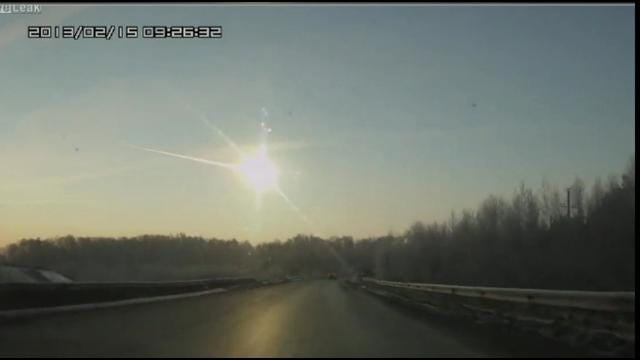Tulsa Astronomy Club Gives Insight Into Near Earth Objects
Astronomers say it usually takes high profile events like this to grab the public's attention. But they hope this fascination leads others to learn more about near Earth objects.Friday, February 15th 2013, 5:33 pm
The meteorite that crashed Friday morning in Russia had the world talking, including Tulsa.
The Astronomy Club of Tulsa said it's a rare event to have such good video footage of a meteorite strike.
We wanted to learn more about it and the asteroid that passed through its nearest distance from Earth Friday afternoon.
Astronomers say it usually takes high profile events like this to grab the public's attention. But they hope this fascination leads others to learn more about near Earth objects.
The meteor exploded with a blinding light over the Russian sky Friday morning, as it entered the Earth's atmosphere. The shock wave was deafening and was followed immediately by breaking glass and car alarms.
"Something like this will surprise the pants off you," said Lee Bickle, of the Astronomy Club of Tulsa.
He was up early watching the coverage closely when the meteor exploded over the Russian city of Chelybinsk.
2/14/2013 Related Story: Hundreds Injured As Meteorite Falls On Central Russia
He said it was traveling close to 20 miles per second.
"So, if you could imagine, if that had started over Oklahoma City, it'd be in Tulsa by the time I just said that sentence," Bickle said.
Late Friday afternoon, Russian news released pictures of one of the impact points You can see the 33-foot diameter hole it made in the ice, covering a lake. The black dots seen in the picture are actually bits of the meteorite as it broke apart.
The question many have is, is this Russia meteorite connected to Asteroid 2012 DA14?
2/15/2013 Related Story: Watch Live: Asteroid Buzzes Earth, Missing By 17,150 Miles
The asteroid came within 17,000 miles of Earth Friday afternoon, but Bickle said it's not related to the Russian meteor as its coming from a different direction.
"It's actually traveling toward the north and it'll be coming out of the north-northwest," Bickle said. "It's coming over Asia, then Europe, and finally we'll be able to be in that path."
Bickle said these two events can be a rallying point for astronomy, a chance to introduce the science to those who might not normally pay close attention.
"This is the kind of thing that connects astronomy to the just everyday guy, who doesn't care much about astronomy or whatever. You realize, 'Oh, I want to know what that is,'" Bickle said.
The Astronomy Club of Tulsa will have its telescope up and running Friday night, just after sunset at the Mounds Observatory.
There's not much room, but if you're interested, it's 8 miles west of Highway 75 on 241st Street.
More Like This
February 15th, 2013
September 29th, 2024
September 17th, 2024
Top Headlines
December 14th, 2024
December 14th, 2024
December 14th, 2024
December 14th, 2024












